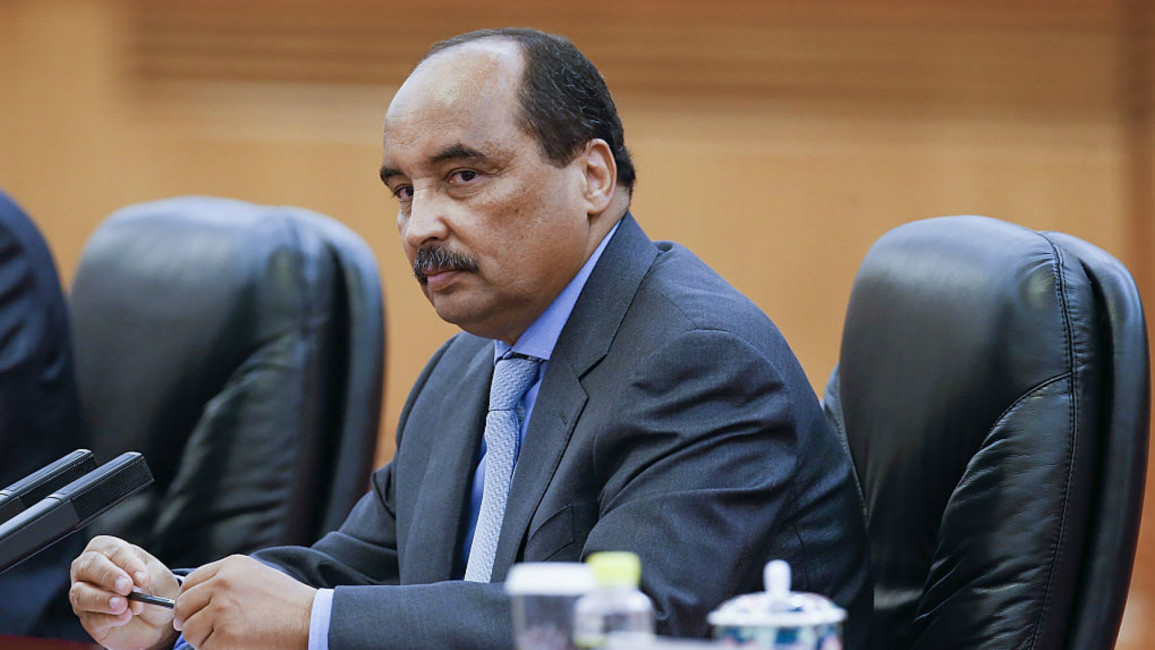
Mauritania president pushes ahead with bid to abolish senate
Mauritania president pushes ahead with bid to abolish senate
Blog: Mohamed Ouled Abdel Aziz will launch a popular referendum to get rid of parliament's second chamber.
3 min read
President Mohamed Ouled Abdel Aziz wants te Senate replaced with local councils [AFP]
Mauritania's Senate house has blocked a government proposal to amend the constitution to change its flag and anthem - and to abolish the Senate itself.
But the political battle is far from over, with President Mohamed Ouled Abdel Aziz pushing for a popular
referendum.
For more than six months the ruling Union For The Republic party has sought a change to national symbols, despite serious objections from hardline opposition - which says any modification to the country's flag, anthem or constitution without popular consent is illegal.
In March, Abdel Aziz secured 80 percent of votes in the national assembly to secure a sweeping victory for his bid, though his momentum hit a brick wall when 33 of 56 senators in the second chamber voted it down, drawing an angry response from the president.
"We cannot allow 33 senators who voted against these
amendments to hold the whole country hostage," Abdel Aziz told reporters in Nouakchott.
"There is one way out: we will hold a referendum."
The opposition National Forum for Democracy and Unity, meanwhile, welcomed the Senate's decision.
"The absurd constitutional amendments that the government tried to impose have been dismissed, and the Mauritanian people's will to refuse downplaying its constitution has triumphed," read a statement.
The president's referendum plan, which would see the Senate replaced with administrative regional councils
across the country is "a rebellion against democratic legitimacy and a fresh attempt to impose the will of one
individual on the entire nation," said the National Forum.
The government appears to be attempting to use the popular vote as a way to weaken the status of the opposition by dragging it to a major political loss in a supposedly democratic show of power.
With widespread allegations of electoral corruption, the opposition is reluctant to go to the ballot box.
The importance of this all this lies in the timing - as it follows the president's denial that he would run for a third term of office. As an alumnus of the military school of political power, Abdel Aziz is paving the ground for a likely successor of the same background, leaving the opposition even fewer chances to win the 2019 presidential election.
Analysts say that abolishing the Senate in favour of a unicameral parliament is an indicator that the government fears the senior chamber as a threat to its future grip on power.
Habibulah Mohamed Lamin is a journalist based in the Western Sahara refugee camps in Tindouf, Algeria. He has worked as a translator and is director of Equipe Media Branch, a group of media activists covering Western Sahara. His work focuses on politics and culture of the Maghreb.
Follow him on Twitter: @habibullahWS
But the political battle is far from over, with President Mohamed Ouled Abdel Aziz pushing for a popular
referendum.
For more than six months the ruling Union For The Republic party has sought a change to national symbols, despite serious objections from hardline opposition - which says any modification to the country's flag, anthem or constitution without popular consent is illegal.
In March, Abdel Aziz secured 80 percent of votes in the national assembly to secure a sweeping victory for his bid, though his momentum hit a brick wall when 33 of 56 senators in the second chamber voted it down, drawing an angry response from the president.
"We cannot allow 33 senators who voted against these
amendments to hold the whole country hostage," Abdel Aziz told reporters in Nouakchott.
"There is one way out: we will hold a referendum."
The opposition National Forum for Democracy and Unity, meanwhile, welcomed the Senate's decision.
"The absurd constitutional amendments that the government tried to impose have been dismissed, and the Mauritanian people's will to refuse downplaying its constitution has triumphed," read a statement.
 |
With widespread allegations of electoral corruption, the opposition is reluctant to go to the ballot box |  |
The president's referendum plan, which would see the Senate replaced with administrative regional councils
across the country is "a rebellion against democratic legitimacy and a fresh attempt to impose the will of one
individual on the entire nation," said the National Forum.
The government appears to be attempting to use the popular vote as a way to weaken the status of the opposition by dragging it to a major political loss in a supposedly democratic show of power.
With widespread allegations of electoral corruption, the opposition is reluctant to go to the ballot box.
The importance of this all this lies in the timing - as it follows the president's denial that he would run for a third term of office. As an alumnus of the military school of political power, Abdel Aziz is paving the ground for a likely successor of the same background, leaving the opposition even fewer chances to win the 2019 presidential election.
Analysts say that abolishing the Senate in favour of a unicameral parliament is an indicator that the government fears the senior chamber as a threat to its future grip on power.
Habibulah Mohamed Lamin is a journalist based in the Western Sahara refugee camps in Tindouf, Algeria. He has worked as a translator and is director of Equipe Media Branch, a group of media activists covering Western Sahara. His work focuses on politics and culture of the Maghreb.
Follow him on Twitter: @habibullahWS


![President Pezeshkian has denounced Israel's attacks on Lebanon [Getty]](/sites/default/files/styles/image_684x385/public/2173482924.jpeg?h=a5f2f23a&itok=q3evVtko)



 Follow the Middle East's top stories in English at The New Arab on Google News
Follow the Middle East's top stories in English at The New Arab on Google News


